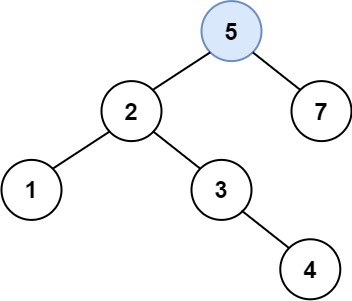Insert into a binary search tree
# Definition for a binary tree node.
# class TreeNode:
# def __init__(self, val=0, left=None, right=None):
# self.val = val
# self.left = left
# self.right = right
class Solution:
def __init__(self):
self.prev = None
def insertIntoBST(self, root: Optional[TreeNode], val: int) -> Optional[TreeNode]:
if not root:
return TreeNode(val)
node = root
while node:
self.prev = node
if node.val > val:
node = node.left
elif node.val < val:
node = node.right
new = TreeNode(val)
if val > self.prev.val:
self.prev.right = new
else:
self.prev.left = new
return root
# def insertIntoBST(self, root: Optional[TreeNode], val: int) -> Optional[TreeNode]:
# if not root:
# node = TreeNode(val)
# return node
# if root.val > val:
# root.left = self.insertIntoBST(root.left, val)
# if root.val < val:
# root.right = self.insertIntoBST(root.right, val)
# return root
Insert into a Binary Search Tree
You are given the root node of a binary search tree (BST) and a value to insert into the tree. Return the root node of the BST after the insertion. It is guaranteed that the new value does not exist in the original BST.
Notice that there may exist multiple valid ways for the insertion, as long as the tree remains a BST after insertion. You can return any of them.
Example 1:

Input: root = [4,2,7,1,3], val = 5 Output: [4,2,7,1,3,5] Explanation: Another accepted tree is:
Example 2:
Input: root = [40,20,60,10,30,50,70], val = 25 Output: [40,20,60,10,30,50,70,null,null,25]
Example 3:
Input: root = [4,2,7,1,3,null,null,null,null,null,null], val = 5 Output: [4,2,7,1,3,5]
Constraints:
- The number of nodes in the tree will be in the range
[0, 104]. -108 <= Node.val <= 108- All the values
Node.valare unique. -108 <= val <= 108- It's guaranteed that
valdoes not exist in the original BST.
